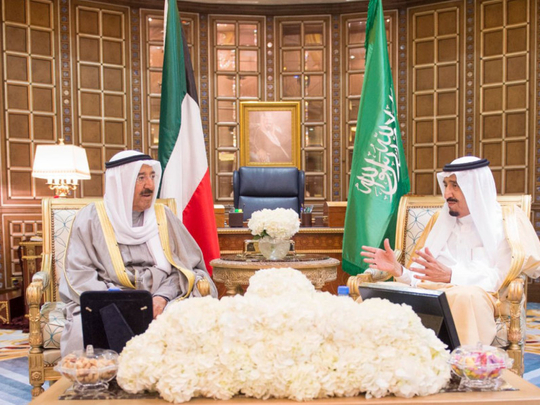
Manama: Saudi King Salman Bin Abdul Aziz Al Saud and Kuwait’s Emir Shaikh Sabah Al Ahmad Al Jaber Al Sabah held a meeting in the Saudi capital Riyadh on Sunday.
Both countries official news agencies said that the two leaders “exchanged brotherly talks that reflected the depth of bilateral ties between the neighbouring countries at all levels.”
They also discussed means of continuously boosting those ties, and ways of supporting the Gulf Cooperation Council (GCC) countries’ mutual goals and interests to fulfil the aspirations of the Gulf people, the Kuwait News Agency (Kuna) reported.
“In addition, the two leaders touched on the current regional and international issues of common interest.”
The meeting was reportedly attended by Saudi Crown Prince and Deputy Premier Muqrin Bin Abdul Aziz Al Saud and Saudi Deputy Crown Prince, Second Deputy Premier and Minister of Interior Prince Mohammad Bin Nayef Bin Abdul Aziz.
The Kuwaiti delegation included First Deputy Prime Minister and Foreign Minister Shaikh Sabah Al Khalid Al Hamad Al Sabah, Kuna said.
King Salman who assumed power in the vast kingdom on January 23 upon the death of his brother King Abdullah hosted a luncheon banquet in honour of the Kuwaiti Emir and delegation.
Last week, Qatar’s Emir Shaikh Tamim Bin Hamad Al Thani met Prince Mohammad in the Qatari capital Doha.
According to official news agencies, the meeting reviewed the relations between Qatar and Saudi Arabia and ways of enhancing them in various fields.
The two leaders also discussed the regional and international situation and exchanged views on issues of common concern, official reports said.
Qatar in December hosted the annual GCC summit following the settlement of the worst diplomatic crisis to hit the alliance since it was established in 1981.
The GCC comprises Bahrain, Kuwait, Oman, Qatar, Saudi Arabia and the UAE.
The summit became possible only after the member countries endorsed an agreement that ironed out differences and defined a common approach to all issues of common interest.
The late Saudi King Abdullah played a crucial role in reaching the accord.











